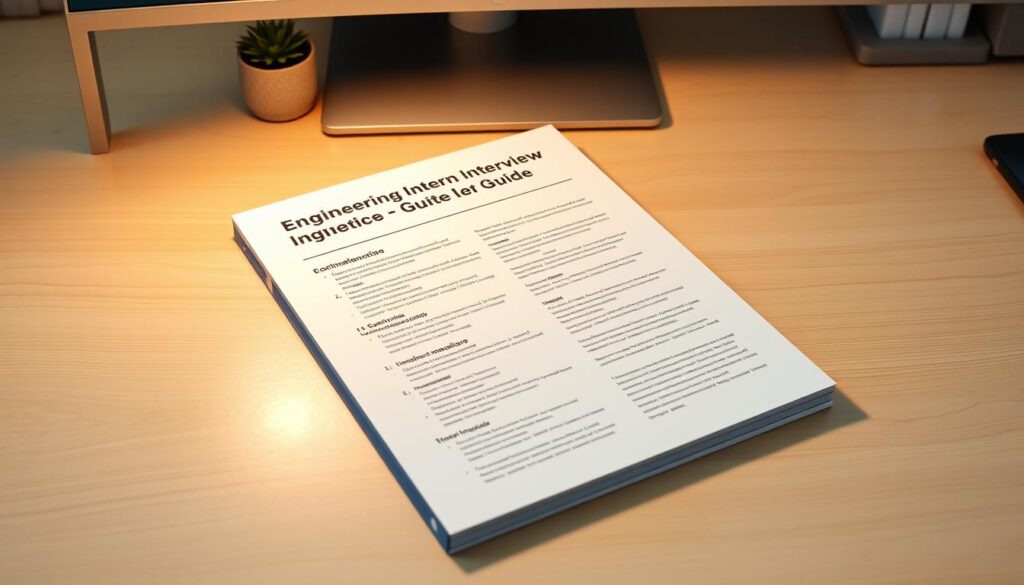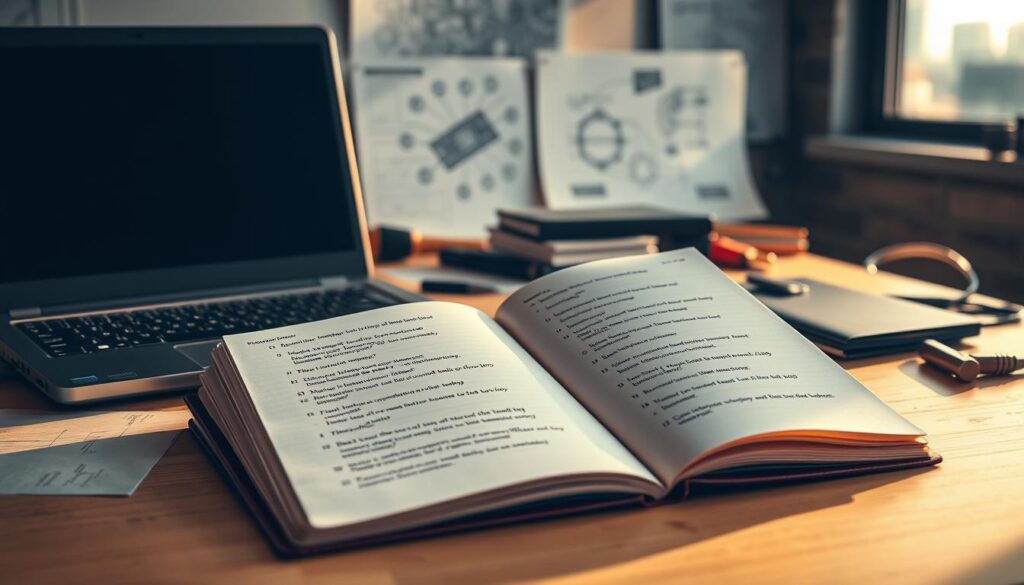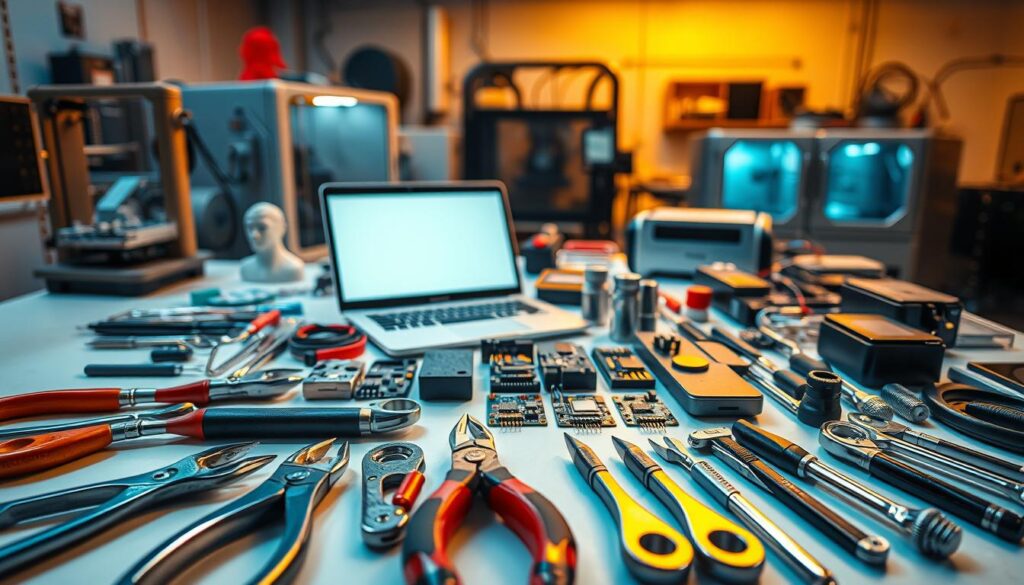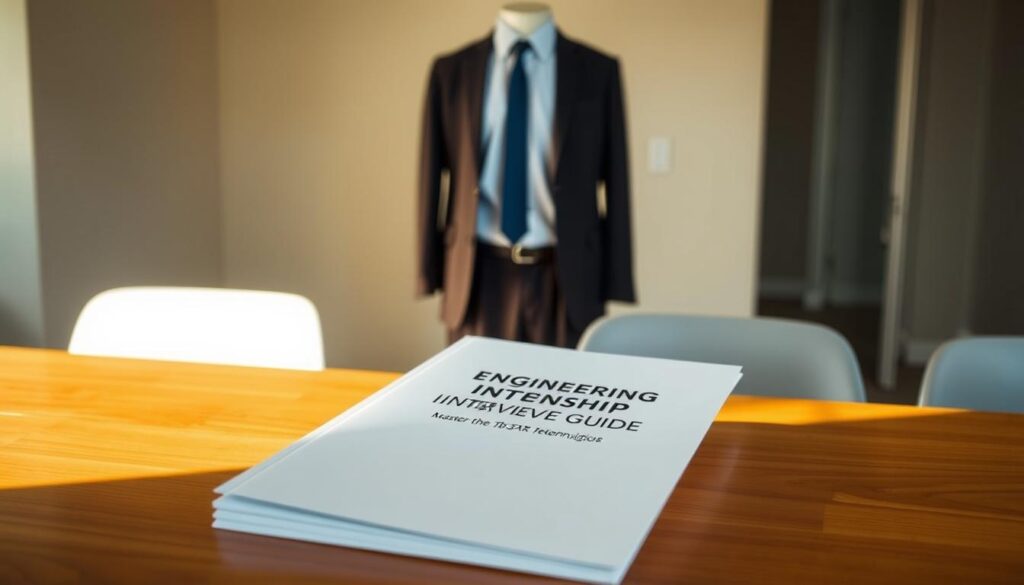Did you know that landing a coveted engineering internship can be a game-changer for your career? With competition getting fiercer by the day, acing the interview is crucial to standing out from the crowd.
An engineering internship is a vital stepping stone toward building a successful career, offering hands-on experience and industry exposure. To increase your chances of success, it’s essential to be well-prepared for the interview. Check out our guide on how to secure an internship in a construction to get started.
Key Takeaways
- Tailor your resume and cover letter for each internship application.
- Prepare for common interview questions, such as “What sparked your interest in the industry?”
- Make a great impression during the interview by being punctual and dressing appropriately.
- Show enthusiasm for the industry and the company.
- Utilize professional associations and LinkedIn for networking.
Understand the Internship Role
Grasping the details of the internship role is essential for effective engineering internship interview preparation. To make a good impression, you need to demonstrate a clear understanding of the role and its requirements.
Review the Job Description
The first step in understanding the internship role is to thoroughly review the job description. This involves more than just reading the job posting; it requires analyzing the responsibilities, required skills, and preferred qualifications. By doing so, you can tailor your application and preparation to match the employer’s needs.
Carefully examine the job description to identify key phrases and qualifications. This will help you understand what the employer is looking for in a candidate.
Identify Key Responsibilities
Once you have reviewed the job description, identify the key responsibilities of the internship role. This involves understanding the day-to-day tasks, projects, and expectations. Being aware of these responsibilities will help you prepare relevant examples and answers during the interview.
Dot Points of Required Skills
Make a list of the required skills and qualifications for the internship role. This could include technical skills, soft skills, or specific knowledge areas. Understanding these requirements will enable you to highlight your relevant skills and experiences during the interview.
By following these steps, you can demonstrate your interest in the role and show that you are well-prepared for the engineering internship interview questions that may arise.
Research the Company

Researching the company you’re interviewing with is a crucial step in making a great impression during your engineering internship interview. This involves understanding the company’s history, mission, values, recent projects, and industry trends. By doing so, you can demonstrate your interest and enthusiasm for the role and show how you can contribute to the company’s goals.
Explore Company Values
Understanding a company’s values is essential to showing your alignment with its culture. You can usually find this information on the company’s website, typically under sections like “About Us” or “Our Mission.” Coursera’s guide on internship interview questions emphasizes the importance of researching the company culture.
For example, if a company values innovation, you might want to highlight any innovative projects you’ve worked on or ideas you’ve implemented in your previous roles.
Familiarize Yourself with Recent Projects
Familiarizing yourself with the company’s recent projects or products can help you understand their current focus and how you can contribute to it. Look for news articles, press releases, or the company’s blog to stay updated.
Understand Industry Trends
Understanding the industry trends that the company operates in can help you have more meaningful conversations during the interview. You can find this information through industry reports, news articles, or professional networks like LinkedIn.
For instance, if the company is in the civil engineering sector, you might want to be aware of the latest developments in sustainable construction practices. World Civil Society’s guide on civil engineering job can provide valuable insights into the industry.
| Research Area | Key Points to Look For |
|---|---|
| Company Values | Mission statement, core values, company culture |
| Recent Projects | Latest products, innovations, press releases, company blog |
| Industry Trends | Industry reports, news articles, LinkedIn, professional networks |
By thoroughly researching the company, you can demonstrate your enthusiasm and interest in the role, making a positive impression on the interviewer. This preparation will also help you to have more meaningful conversations during the interview.
Prepare Your Resume
A well-prepared resume can significantly boost your chances of acing an engineering internship interview. It’s essential to showcase your skills, experience, and achievements in a clear and concise manner.
Highlight Relevant Experience
When applying for an engineering internship, highlighting relevant experience is crucial. This includes any academic projects, research work, or extracurricular activities that demonstrate your engineering skills. For instance, if you’re applying for a civil engineering internship, you might highlight your involvement in a civil engineering project or your participation in a related competition.
Tailor for the Specific Role
Tailoring your resume for the specific role you’re applying for is vital. Study the job description carefully and ensure that your resume reflects the required skills and qualifications. Use keywords from the job posting to help your resume pass through applicant tracking systems (ATS) and catch the eye of the hiring manager.
Include Key Projects
Including key projects in your resume can help demonstrate your capabilities to potential employers. Make sure to describe the project, your role in it, and the outcomes or achievements. For example, you might describe a project where you designed and implemented a solution to a complex engineering problem, highlighting your technical skills and problem-solving abilities.
| Project | Description | Outcomes |
|---|---|---|
| Bridge Design Project | Designed a sustainable bridge using advanced engineering software | Awarded for innovative design and structural integrity |
| Robotics Competition | Developed a robotic system for a national competition | Ranked top 10 nationally for performance and design |
Practice Common Interview Questions

To succeed in an engineering internship interview, it’s crucial to practice common interview questions that assess both technical skills and behavioral competencies.
Technical Questions You Might Face
Technical questions are a critical component of engineering internship interviews. These questions are designed to test your understanding of engineering principles, problem-solving skills, and ability to apply theoretical knowledge to practical problems.
For instance, you might be asked to explain complex engineering concepts or solve problems on a whiteboard. Practicing problems related to your field, such as those found on platforms like LeetCode or through professional engineering societies, can be very beneficial.
Behavioral Interview Questions
Behavioral interview questions aim to understand how you’ve handled situations in the past, which can indicate how you’ll perform in the future. These questions often start with “Tell me about a time when…” or “Can you give an example of….”
To prepare, reflect on your past experiences, including projects, internships, or academic assignments. Use the STAR method (Situation, Task, Action, Result) to structure your responses, highlighting your role and the positive outcomes of your actions.
Situational Questions to Consider
Situational questions present hypothetical scenarios to assess how you would handle specific situations relevant to the internship role. These questions evaluate your problem-solving skills, creativity, and ability to think on your feet.
For example, you might be asked how you would manage a project with tight deadlines or how you would handle a disagreement with a team member. Preparing for these questions involves understanding the company’s values and culture, as well as practicing responses to common situational questions.
For more insights on preparing for engineering internship interviews, you can explore resources like entry-level civil engineering job advice, which can provide valuable tips and guidance.
| Question Type | Example | Tips for Preparation |
|---|---|---|
| Technical | Explain the principles of stress and strain. | Review engineering textbooks, practice problems online. |
| Behavioral | Tell me about a time you overcame a significant challenge. | Use the STAR method, reflect on past experiences. |
| Situational | How would you handle a last-minute project change? | Understand company culture, practice responding to hypotheticals. |
“The way to get started is to quit talking and begin doing.”
Develop Your Own Questions
Preparing questions in advance for your engineering internship interview is a strategic move that showcases your enthusiasm and helps you evaluate the internship’s potential. An interview isn’t just an opportunity for the employer to assess you but also your chance to evaluate if the role fits your goals.
Ask About Team Culture
Understanding the team culture is vital as it can significantly impact your daily work life and overall job satisfaction. You might ask, “Can you describe the team’s dynamics and how they support interns?” or “How does the team collaborate on projects?”
Inquire About Growth Opportunities
It’s essential to know if the company invests in the growth and development of its interns. Questions like, “What opportunities are there for professional development and mentorship?” or “How have past interns progressed within the company?” can provide valuable insights.
Clarify Responsibilities
Clarifying your responsibilities ensures you understand your role and what is expected of you. Consider asking, “Can you elaborate on the day-to-day responsibilities of this internship?” or “How does this role contribute to the team’s objectives?”
As Bill Gates once said,
“The most important thing in technology is not the technology itself, but how it changes people’s lives.”
Asking the right questions can help you understand how the internship will impact your career and personal growth.
| Question Category | Example Questions | Benefits |
|---|---|---|
| Team Culture | “Can you describe the team’s dynamics?” | Understand team collaboration and support |
| Growth Opportunities | “What opportunities are there for professional development?” | Learn about career progression and mentorship |
| Responsibilities | “Can you elaborate on the day-to-day responsibilities?” | Clarify role expectations and contributions |
Learn About Engineering Tools and Technologies

Understanding the software and platforms relevant to your engineering discipline is a key aspect of preparing for your internship interview. Familiarity with industry-standard tools can significantly enhance your ability to contribute to projects and understand the work environment.
Focus on Software and Platforms
It’s essential to be familiar with software commonly used in your engineering field. For instance, if you’re in mechanical engineering, knowledge of SolidWorks or AutoCAD can be highly beneficial. For those in electrical engineering, familiarity with MATLAB or SPICE can be advantageous.
- MATLAB: Widely used for numerical computation and data analysis.
- AutoCAD: Essential for drafting and design.
- SolidWorks: Critical for 3D modeling and simulation.
- Python: A versatile programming language used across various engineering disciplines.
Make a list of the tools and software relevant to your field and ensure you’re comfortable using them.
Understand Current Engineering Practices
Staying updated with current engineering practices is vital. This includes understanding methodologies like Agile development, Lean principles, or other practices relevant to your field.
Current engineering practices often involve:
- Iterative design and development.
- Collaboration and communication within teams.
- Continuous learning and adaptation to new technologies.
Being aware of these practices demonstrates your readiness to adapt and contribute to the team.
Know Your Technical Skills
Assessing your technical skills in relation to the internship requirements is crucial. Make a table to evaluate your proficiency level in various tools and technologies.
| Tool/Technology | Proficiency Level | Relevance to Internship |
|---|---|---|
| MATLAB | Advanced | High |
| AutoCAD | Intermediate | Medium |
| Python | Advanced | High |
This self-assessment will help you identify areas where you need to improve before the interview.
Dress Appropriately for the Interview
The way you dress for your engineering internship interview says a lot about your professionalism. It’s essential to make a great first impression, and your attire plays a significant role in this.
Understand the Company Dress Code
Before deciding on what to wear, research the company’s dress code. You can check their website, social media, or contact someone who works there to get an idea of their culture.
- Check the company’s website or social media for dress code cues.
- Ask current or former interns or employees about the dress code.
- Observe the dress code in photos or videos of company events.
Aim for Professional Attire
Regardless of the company’s dress code, it’s always a good idea to aim for professional attire. For men, this could mean a suit and tie, while for women, it could be a professional dress or a blouse with a skirt or trousers.
Key elements of professional attire include:
- Clean, ironed clothes.
- Appropriate footwear, such as dress shoes.
- Minimal jewelry and accessories.
Consider Comfort vs. Style
While looking professional is crucial, it’s also important to be comfortable. You want to be able to focus on the interview, not on adjusting your clothes or dealing with discomfort.
Balancing comfort and style means choosing clothes that are both professional and comfortable. For example, you can opt for a blazer over a comfortable shirt or blouse, or choose shoes that are dressy yet comfortable.
Master the STAR Technique

Mastering the STAR technique can significantly enhance your performance in engineering internship interviews by helping you structure your responses.
Situation, Task, Action, Result Explained
The STAR technique is a method for answering behavioral interview questions in a structured manner. It stands for Situation, Task, Action, and Result. By using this framework, you can provide clear and concise answers that highlight your skills and experiences.
Situation: Set the context for the story you’re about to tell. This should be a brief overview of the situation.
Task: Explain the task or problem you faced in that situation.
Action: Describe the actions you took to address the task or problem.
Result: Share the outcome of your actions, focusing on the achievements and what you learned.
Examples of STAR in Action
For example, if you’re asked, “Tell me about a time when you had to solve a complex engineering problem,” you could respond using the STAR technique:
- Situation: “In my final year project, we were tasked with designing a sustainable bridge model.”
- Task: “Our task was to ensure the bridge could withstand certain stress loads while minimizing material usage.”
- Action: “I led a team to analyze different materials and designs, and we decided to use a combination of traditional and innovative materials to achieve our goals.”
- Result: “Our design not only met but exceeded the stress load requirements, and we received an A grade for the project.”
Practice with Mock Interviews
To become more comfortable with the STAR technique, practicing with mock interviews is invaluable. You can ask a friend or mentor to conduct a mock interview with you, or you can record yourself answering common engineering internship interview questions.
| Common Interview Questions | STAR Elements to Focus On |
|---|---|
| Tell me about a challenging project you worked on. | Situation, Task, Action |
| Describe a time when you had to work under pressure. | Task, Action, Result |
| Can you give an example of a team project you were proud of? | Situation, Action, Result |
By mastering the STAR technique and practicing with mock interviews, you’ll be well-prepared to tackle behavioral interview questions and make a strong impression during your engineering internship interview.
Be Ready for Technical Assessments
As you prepare for your engineering internship interview, it’s essential to understand what to expect in technical assessments. Technical assessments are a common part of the interview process for engineering internships, designed to evaluate your problem-solving skills, technical knowledge, and ability to work under pressure.
What to Expect in Technical Tests
Technical tests can vary in format but often include coding challenges, problem-solving exercises, or technical questions related to the field of engineering you’re applying to. You may be tasked with a whiteboard challenge or an independent coding test. Be prepared to explain each step of the process as you work through it.
Tips for Problem-Solving on the Spot
To excel in technical assessments, practice problem-solving under timed conditions. Familiarize yourself with common data structures and algorithms. For more tips, you can visit this resource on preparing for technical interviews.
| Problem-Solving Tip | Description |
|---|---|
| Understand the Problem | Read the problem carefully and ensure you understand what’s being asked. |
| Break Down the Problem | Divide complex problems into smaller, manageable parts. |
| Communicate Your Thought Process | Explain your approach and thought process as you solve the problem. |
Utilizing Whiteboard for Coding Problems
When faced with a whiteboard coding challenge, clarity is key. Write legibly, use clear and concise variable names, and explain your code as you write it. Practice whiteboarding before the interview to become comfortable with the format.
By understanding what to expect in technical assessments and practicing your problem-solving skills, you’ll be well-prepared to ace the technical aspects of your engineering internship interview.
Communicate Your Passion for Engineering

As you prepare for your engineering internship interview, it’s essential to showcase your passion for the field. Your enthusiasm can be a deciding factor in a competitive interview process. To effectively communicate your passion, you need to share your motivation for the field, discuss your career goals, and highlight any extracurricular involvement.
Share Your Motivation for the Field
Your motivation for pursuing a career in engineering is a crucial aspect of your interview. Be prepared to discuss what sparked your interest in engineering and how it has driven you to seek an internship in this field. For instance, you could talk about a project you worked on, a challenging problem you solved, or a particular area of engineering that fascinates you.
Key points to cover:
- Early experiences that sparked your interest in engineering
- Relevant projects or achievements
- Specific areas of engineering you’re passionate about
Discuss Your Career Goals
Clearly articulating your career goals demonstrates your commitment to the field and your willingness to grow. Be prepared to discuss how this internship aligns with your long-term objectives and how it will help you achieve your career aspirations.
Example: “I’m excited about this internship because it aligns with my career goal of becoming a leading software engineer. I’m confident that the skills and experience I gain here will be invaluable in my future endeavors.”
| Career Goal | Relevant Skills | Internship Alignment |
|---|---|---|
| Become a leading software engineer | Programming languages, software development methodologies | Gaining hands-on experience in software development |
| Advance in mechanical engineering | CAD design, mechanical systems analysis | Working on real-world mechanical engineering projects |
Highlight Any Extracurricular Involvement
Any extracurricular activities related to engineering, such as participating in hackathons, engineering clubs, or personal projects, can significantly enhance your profile. Be prepared to discuss these activities and how they’ve contributed to your skills and knowledge.
By effectively communicating your passion for engineering, you can leave a lasting impression on your interviewers and increase your chances of success.
Prepare for Virtual Interviews
In today’s digital age, mastering the art of virtual interviews is essential for landing your dream engineering internship. As more companies adopt remote hiring processes, it’s crucial to adapt your interview strategy to thrive in a digital environment.
Ensure a Good Technical Setup
A successful virtual interview starts with a reliable technical setup. Ensure your internet connection is stable, and your computer or device is fully charged. Invest in a good quality webcam and headphones to avoid any echo or distortion during the interview.
Key Technical Requirements:
- Stable internet connection
- Updated computer or device software
- Good quality webcam
- Noise-cancelling headphones
Dress Code Adaptations for Online
Even though the interview is virtual, dressing professionally is still important. It not only makes a good impression on the interviewer but also helps you get into a professional mindset. Choose attire that is modest, clean, and professional, avoiding overly casual or bright colors.
Consider the company culture when selecting your virtual interview attire.
| Dress Code Element | Recommendation |
|---|---|
| Colors | Neutral or muted tones |
| Attire | Professional, modest clothing |
| Accessories | Minimal, avoid distractions |
Maintain Good Virtual Etiquette
Virtual etiquette is just as important as in-person etiquette. Ensure you are in a quiet, well-lit space with a plain background. Minimize distractions by turning off notifications and finding a quiet spot away from foot traffic.
By following these tips, you can ensure a smooth and successful virtual interview experience, showcasing your skills and personality effectively to potential employers.
Network with Current Interns or Employees

Networking with current interns or employees can be a game-changer in preparing for your engineering internship interview. By connecting with individuals who are already part of the company or program you’re applying to, you can gain valuable insights that will help you stand out as a candidate.
Utilizing LinkedIn for Connections
LinkedIn is a powerful tool for networking. To utilize it effectively, start by searching for current interns or employees at the company you’re interested in. You can do this by using the search bar and filtering results by company name and job title. Once you’ve identified potential connections, send them a personalized invitation to connect.
When reaching out, make sure to:
- Mention how you came across their profile
- Explain why you’re interested in connecting
- Keep your message concise and respectful
After establishing a connection, you can engage with their content, ask for advice, or request a brief informational interview.
Informational Interviews as Prep
Informational interviews are a great way to gather information about the company culture and the internship experience. When you request an informational interview, be clear about your intentions and show respect for the other person’s time.
Some tips for conducting informational interviews include:
- Prepare thoughtful questions in advance
- Be respectful of their time and schedule
- Take notes during the conversation
- Follow up with a thank-you note or email
Gathering Insights on Company Culture
Gathering insights on company culture is crucial for understanding whether you’ll be a good fit for the organization. During your interactions with current interns or employees, ask about their experiences, challenges, and what they enjoy about working there.
Key areas to inquire about include:
- Team dynamics and collaboration
- Opportunities for growth and development
- Work-life balance
- Company values and mission
By gathering these insights, you’ll be better prepared to ask informed questions during your interview and demonstrate your genuine interest in the role.
Follow Up After the Interview
The follow-up process after an engineering internship interview is just as important as the interview itself. It not only shows your appreciation for the interviewer’s time but also reiterates your interest in the position.
Thank You Email Best Practices
Sending a thank-you email within 24 hours of your interview is considered best practice. This email should be personalized, professional, and polite. Start by expressing your gratitude for the opportunity to interview.
For example, you could say, “I wanted to take a moment to thank you for the opportunity to interview for the engineering internship position at [Company Name].”
Reiterate Your Interest in the Role
Use the thank-you email as an opportunity to reiterate your interest in the role. Mention something specific about the company or the position that resonated with you during the interview.
As Ryan Jenkins, a career expert, once said, “A thank-you note is not just a courtesy; it’s a chance to re-emphasize your fit for the role and leave a lasting impression.”
“The key to a great thank-you note is to make it personal and sincere.”
Keep It Short and Professional
Keep your email concise and to the point. Avoid lengthy paragraphs and ensure that your tone remains professional throughout. For more detailed guidance, you can refer to resources like The Intern Group’s blog on follow-up.
By following these best practices, you can ensure that your follow-up after the interview is effective and leaves a positive impression on your potential employer.
Reflect on Your Performance

A thoughtful reflection on your interview experience is key to refining your approach for future engineering internship interviews. As emphasized by industry leaders, “self-reflection is the key to unlocking your full potential.”
Analyze What Went Well
Begin by identifying the aspects of the interview that went smoothly. Consider the questions you answered confidently, the moments you showcased your skills effectively, and any positive interactions you had with the interviewer. Highlighting these successes can boost your confidence for future interviews.
For instance, if you were asked about a project you worked on, and you felt your explanation was clear and concise, note that down. Reflecting on such moments can help you understand your strengths and how to leverage them in future interviews.
Identify Areas for Improvement
Next, it’s crucial to be honest about the parts of the interview that didn’t go as planned. Were there questions you struggled to answer? Did you feel nervous at any point? Identifying these areas can help you prepare more effectively for future interviews.
For example, if you found it challenging to answer a technical question, you might want to review that topic or practice similar questions. This step is about turning weaknesses into opportunities for growth.
Use Feedback for Future Interviews
If you received any feedback after the interview, whether directly from the interviewer or through a follow-up survey, use it constructively. Feedback is a valuable tool for understanding how you are perceived and how you can improve. Take constructive criticism seriously and incorporate it into your preparation for future interviews.
As
“The greatest glory in living lies not in never falling, but in rising every time we fall.” – Nelson Mandela
, using feedback effectively is about rising above our challenges and becoming better candidates with each interview.
Stay Positive And Confident
As you prepare for your engineering internship interview, maintaining a positive and confident demeanor is crucial. This not only enhances your performance but also leaves a lasting impression on the interviewer. To achieve this, it’s essential to manage interview anxiety effectively.
Managing Interview Anxiety
Techniques such as deep breathing, meditation, and visualization can significantly reduce anxiety. Practicing these techniques can help you stay calm and composed during the interview.
Cultivating a Positive Mindset
A positive mindset plays a vital role in your overall performance. By focusing on your strengths and the value you can bring to the organization, you can boost your confidence and present yourself more effectively.
Visualizing Success
Visualizing yourself succeeding in the interview can have a profound impact on your actual performance. It helps in building confidence and preparing you to tackle challenging questions. For more insights on preparing for an engineering internship, you can explore resources like World Civil Society, which offers valuable advice on engineering internship interview advice and preparing for engineering internship interview.
